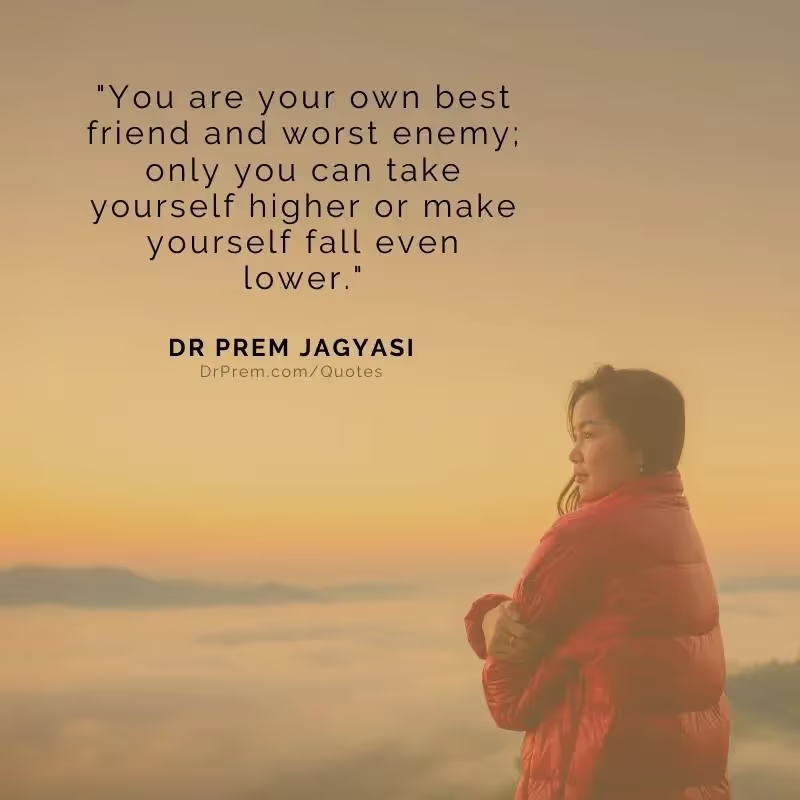Imagine you have a friend in need.You've known this friend for a very long time and though you don't always get along perfectly well, you couldn't imagine...

Imagine you have a friend in need.
You've known this friend for a very long time and though you don't always get along perfectly well, you couldn't imagine your life without them.
Let's say they are struggling with depression, anxiety, addiction, or anything else that has really put them into a hard place.
What would you do?
What would you say to them?
My guess is that you would do almost anything for them.
You would ask them how you could help, and what they need, and you would offer your support, love, and compassion.
You would encourage them to get the help they need even if that meant someone other than yourself because all that would matter is their wellbeing.
At the bare minimum, even if you had no idea how to help, you would be there for them in whatever way possible.
But what if that person, whom you couldn't live without, was you?
Would you treat yourself the same way?
Most of us don't.
Most of us don't think about taking care of ourselves at all.
We suffer in silence, ignore the issues, and keep doing the same things that put us in such a bad situation.
Just imagine, if you treated yourself like someone you care about, imagine what kind of positive changes you could make simply by being a friend to yourself.
Today, that's what we are going to do, learn how to be a friend to yourself.
So many of us tell ourselves things that we would NEVER say to a dear friend who was struggling with the same thing.
For instance, people who have depression often say to themselves that there's no hope, they don't deserve happiness, and that things will never get better.
Can you imagine if your best friend said those things to you?
You would push back, you would find examples to prove it is not true, and you would provide comfort and encouragement.
So why do we tell ourselves these stories with no push-back whatsoever and just allow our depressed mood or anxious thoughts to run the show?
Why don't we stop for a moment and actually treat ourselves with the same love and support that we so willingly give our friends, family, and our pets?
This is the first step to being a friend to yourself.
You have to start thinking of yourself as someone you actually care about.
This begins with the way you talk to yourself.
Whether you are struggling with depression, anxiety, stress, or anything else, your self-talk matters, a lot.
As soon as you recognize that you're telling yourself all the negative things you can think of, flip the script, and change your inner narrative.
Another way to be a friend to yourself is through your actions.
Again, look at this through the lens of someone you care about.
Say a sibling of yours whom you cherish starts to isolate, disconnect from others, and stop doing the things they love.
These are all signs of depression, so what would you do?
Likely, you would try to get them out of the house, move around a little bit, spend time with them, and help them reconnect a little bit.
As you should!
So, once again, to be a friend to yourself take action into your own hands.
If you start feeling disconnected and begin isolating yourself, break those patterns and reach out to others.
Go outside for a walk every day, hit a local coffee shop for an hour 2-3 days a week, and do something that will reconnect you to the world.
You wouldn't let a friend distance themselves from the world, you would remind them how many things there are to do out there.
To be a friend to yourself, take action, make yourself reconnect to the things and people you love.
In order to be a friend to yourself you have to work at it.
The first step is changing the way you talk to yourself, and the second step is changing your daily actions.
But sometimes, especially with depression, it can be very challenging to make even the smallest change.
In this case, the best thing a friend can do is look into resources.

In case you have not picked up on the pattern, in order to get this point across we are going to continue speaking in terms of helping a friend, and this section is no different.
If your friend was depressed, and you tried to help them but they just can climb out of it, then look for resources that might help.
Counseling is always the first thing that comes to mind.
Getting your friend to a professional can make all the difference in the world.
But, if they weren't ready to take that step, there are truly wonderful books out there, hotlines, text lines, documentaries, and more that may be a great place to start.
If your friend wasn't responding to the interventions above then you would certainly be helping them connect to resources like these.
YouTube has great TED talks on mental health; a quick Google search for the best books on depression, anxiety, addiction, etc. is only a click away.
So, if you would do this for a friend in need, why aren't you doing it for yourself?
We have to stop putting ourselves in last place, treating ourselves like we don't deserve love, and affection and care.
At the same time, we can't hope that someone will come and provide all those things for us, but we can provide those things for ourselves.
This is the true meaning of what it looks like to be a friend to yourself.
It isn't easy to break lifelong habits.
But the best time to start is now.
If you are struggling with depression, anxiety, or any mental health issues then be a friend to yourself.
Pay attention to the story you keep telling yourself and change that inner narrative to the kind of narrative you would be telling your best friend if they were struggling.
Take action.
Don't continue the same behavior patterns that got you to where you are, help yourself change the way you live.
And, lastly, if the first two aren't enough, connect to resources that are relevant to what you are struggling with.
The internet is your friend.
Find and connect to mental health counselors today.
Or, at the very least find informational TED talk, books, videos, etc. as a starting point.
It all boils down to this simple question, can you be a friend to yourself?
The answer is yes you can, no matter how awkward it might feel at first.
Be a friend to yourself, and change the way you experience the world.
Yes! There are many effective natural remedies that may be beneficial in managing depressive symptoms, such as participating in regular physical activity, changing your diet, getting adequate sleep, practicing relaxation techniques like yoga or meditation, journaling about your feelings/thoughts/emotions, seeking out social activities/support groups with other individuals struggling with similar issues
There are many helpful resources available, including support groups, online forums, books and websites dedicated to mental health and wellness. Connecting with other people struggling with the same issue can be especially beneficial. Additionally, talking to a trusted friend or family member can provide much-needed social support during difficult times.
Addressing depression is crucial because it can significantly impact your quality of life, overall well-being, and ability to function in daily activities. Left untreated, depression can lead to more severe mental health issues, relationship problems, and physical health complications.
Therapy provides many benefits for people battling depression. Research has shown that cognitive-behavioral therapy (CBT) is particularly effective in managing depressive symptoms. In addition, therapy can teach healthy coping skills and provide emotional support during difficult times. It may also be used as part of a comprehensive treatment plan which includes medication as well as lifestyle changes such as regular exercise and improved nutrition.
Yes! In fact, it's encouraged that you open up to your therapist so they can gain deeper insight into your individual situation and develop the most effective treatment plan possible that works best for you. Your therapist is there to serve as an unbiased source of support who will respect any thoughts or feelings shared within the session without judgment or criticism.
The duration of depression counseling varies for each individual, depending on the severity of their depression and their progress in therapy. Our therapists will regularly assess your progress and adjust your treatment plan as needed.